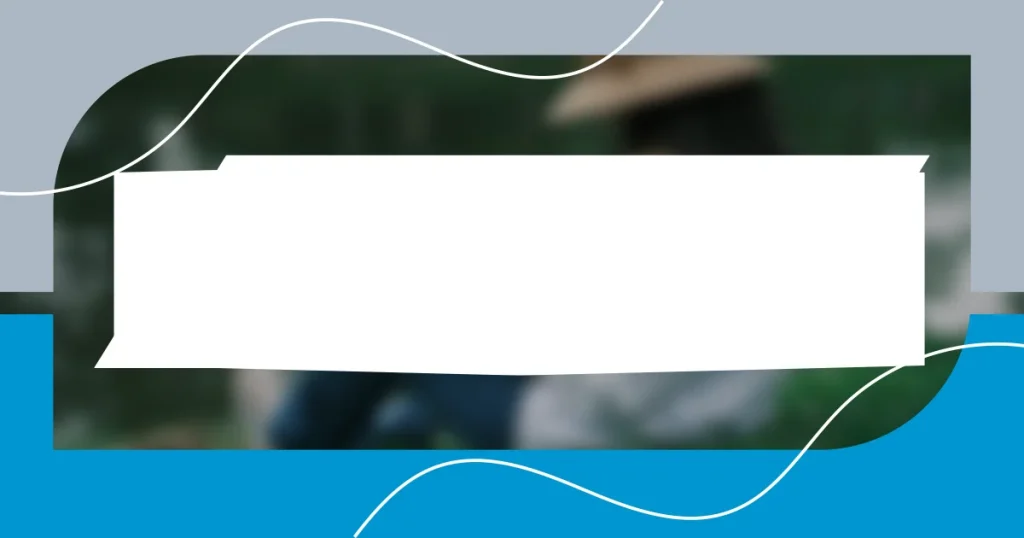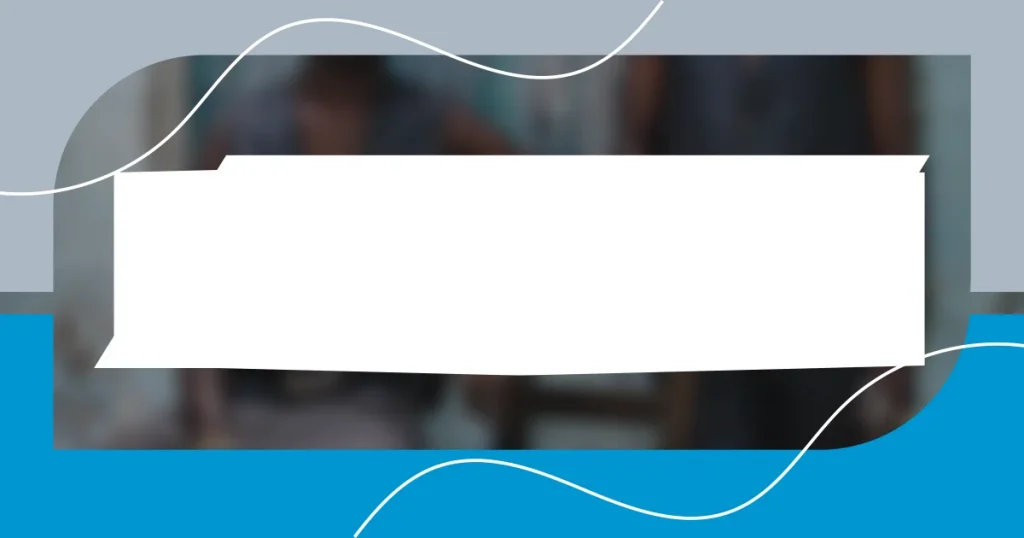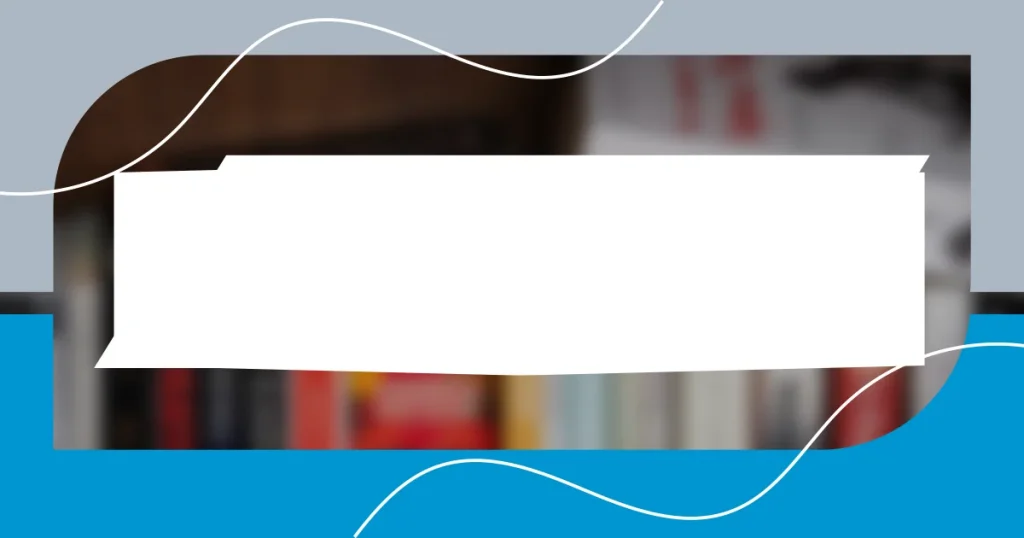Key takeaways:
- Storytelling and vulnerability in social justice writing foster authentic connections and invite deeper conversations about privilege and systemic issues.
- Engaging with marginalized voices through community forums, literature, and personal interactions enhances understanding and representation in narratives.
- Collaborating with others and utilizing social media amplifies voices and creates a broader impact, promoting collective action for social change.

Understanding social justice writing
Understanding social justice writing involves not just expressing a viewpoint but also diving deeply into the narratives and experiences of marginalized groups. I remember the first time I really connected with a piece that spoke about systemic inequality; it was like a light bulb went off in my mind. Why did it resonate so strongly? Because it humanized the issues in a way that statistics alone never could.
One crucial aspect is the power of storytelling. I’ve always believed that telling stories—real stories—gives voice to the voiceless. When I sat down to write about my own experiences with privilege and race, I was amazed at how my anecdotes stirred conversations that went beyond the surface. Wouldn’t it be different if everyone could share their truths with raw honesty?
Moreover, understanding social justice writing means recognizing the emotional labor that often comes with it. It’s not just about crafting words; it’s about bearing witness and inciting change. I’ve felt the weight of this in my own writing, where the responsibility to convey another’s experience can feel daunting. How can we ensure we’re not just amplifying our voice but truly representing those we write about? That’s a question I grapple with every time I put pen to paper.

Identifying key social issues
Identifying key social issues requires a combination of personal reflection and active research. I often find myself reflecting on my own surroundings and experiences. Sometimes, walking down my neighborhood, I notice the stark contrast in resources available to different communities. It sparks a realization that these disparities are not random but are rooted in larger systemic issues that demand attention and understanding.
Here are some key aspects I focus on when identifying these issues:
- Community Engagement: Listening to local voices and understanding their challenges offers invaluable insight.
- Literature Review: Analyzing relevant literature helps me connect personal observations with broader socio-political contexts.
- Personal Reflection: Evaluating my own biases and privileges allows me to approach topics more sensitively.
- Current Events: Staying updated with news and movements often highlights urgent issues that need immediate action.
- Historical Context: Understanding the history behind social issues provides depth and perspective that can be crucial in framing the narrative.
These elements form the backbone of how I approach identifying the social issues that matter. They guide me in ensuring that my writing is not only informative but resonates with the lived experiences of those affected.

Researching diverse perspectives
Researching diverse perspectives is essential in crafting meaningful social justice writing. I’ve always approached this by actively seeking out voices that differ from my own. One time, while attending a community forum, I struck up a conversation with an activist whose views challenged my assumptions. That moment underscored how vital it is to listen, really listen, to individuals impacted by injustice. It’s more than just gathering facts; it’s about weaving together a tapestry of experiences that truly reflects the complexity of social issues.
My journey includes investing time in reading materials created by marginalized groups. I recall picking up a novel by a Black author, which brought me into a world vastly different from mine. The narrative was not only eye-opening but also invited me to empathize with the characters on a deeper level. Understanding different backgrounds through literature and personal narratives can shift one’s perspective profoundly. Can you imagine the impact if everyone took the time to engage with stories from different communities? It could lead to more nuanced and responsible writing.
Additionally, in my experience, participating in workshops and discussions can significantly enhance my understanding. I remember attending a panel about Indigenous rights, where community members shared their stories firsthand. The emotional resonance of their experiences sparked a desire in me to carry those truths into my writing. How often do we consider the importance of direct engagement over second-hand accounts? It’s through these direct encounters that I gain a richer understanding of the issues and strengthen my responsibility as a writer.
| Approach | Description |
|---|---|
| Community Forums | Engaging directly with activists and community members to hear their experiences and perspectives. |
| Reading Diverse Literature | Exploring books and articles by marginalized authors to deepen understanding and empathy. |
| Participatory Workshops | Attending discussions and panels where individuals share firsthand experiences to foster direct engagement. |

Developing a personal writing style
Developing a personal writing style is vital for authentic social justice writing. I’ve found that it often begins with a genuine exploration of my own voice. I remember sitting at my desk, struggling to find the right words for a piece, when I realized that allowing my emotions to flow onto the page was key. Writing from the heart makes my work resonate more deeply with readers—after all, isn’t authenticity what connects us?
One aspect of my style is embracing vulnerability. I once wrote about my own experiences with privilege, sharing moments that were uncomfortable yet necessary to express. That act of sharing not only helped me confront personal biases but also invited others to join the conversation about privilege and accountability. Have you ever shared a vulnerable moment in your writing? That leap of faith can lead to more profound connections with your audience.
Experimenting with different formats has also played a significant role in shaping my style. I recall an article I wrote in a letter format, addressing a friend about their complacency regarding social issues. It felt like a personal conversation rather than a formal essay, and the feedback was overwhelmingly positive. That experience taught me that varying my approach can breathe fresh life into my writing. What if we all dared to break free from traditional conventions? The possibilities are endless, and the impact profound.

Engaging with marginalized voices
Engaging with marginalized voices requires more than just hearing their stories; it demands a genuine commitment to understanding their realities. I vividly remember attending a local art exhibit showcasing the work of LGBTQ+ artists. Each piece conveyed not just beauty but also pain, resilience, and hope. Standing there, I felt an overwhelming sense of responsibility to honor those narratives in my writing. Have you ever been so moved by art that it forced you to reevaluate your own perceptions? Those moments remind me how crucial it is to engage deeply with the experiences of those often silenced.
I’ve learned that creating safe spaces for conversation can empower marginalized voices to share their truths. During a community dialogue on racial justice, I facilitated a small group to ensure everyone could contribute. The energy in the room shifted when a young woman shared her story of discrimination, and I could feel the weight of her experience lifting as she spoke. It struck me then just how powerful it is to give people the platform to express themselves. Why is it that we often hesitate to make space for these voices? That hesitation can lead to missed opportunities for growth and understanding.
Additionally, utilizing social media as a tool for engagement has proven beneficial. I once participated in a Twitter chat focusing on disability rights, where advocates shared their experiences in real-time. It was fascinating to witness so many voices uniting around shared struggles and triumphs. Engaging directly in these online spaces not just informed my perspectives but also created a community of allyship and support. Have you considered how social media can bridge gaps between differing experiences? By amplifying these voices, we not only educate ourselves but also contribute to a larger movement for social change.

Crafting impactful narratives
Crafting impactful narratives involves weaving together personal experiences with the stories of others. I recall a moment when I interviewed a survivor of domestic violence for a piece. It was a challenging conversation; every detail revealed layers of pain and resilience that left me in awe. How do we capture such profound experiences without trivializing them? I learned that allowing the subject’s voice to shine through, rather than attempting to insert my own perspective overly, creates a more genuine narrative.
Bringing emotion into storytelling can transform a basic account into something truly compelling. During one particular writing workshop, we were encouraged to write from a place of deep feeling—something that forced me to revisit my own past struggles with mental health. As I wrote, I found that vulnerability in sharing my story unlocked a powerful connection with readers. Have you ever felt the weight of your story in such a way that it became a bridge between your experiences and those of others? That’s the magic of impactful narratives; they resonate because they reflect shared human experiences.
Moreover, I think about the structure of the narrative itself. Early on, I experimented with storytelling timelines, mixing present reflections with past events. This technique allowed me to build suspense and emotional depth, making the reader question the outcomes as they ventured through the narrative with me. For instance, when I wrote about a social justice protest I attended, I started with the adrenaline-filled moments of marching and then wove in flashbacks to my initial fears and doubts about participating. Did that unpredictability engage my readers more? Absolutely! It reminded me that storytelling isn’t just about the message; it’s also about the journey we take together.

Sharing and promoting your work
Sharing my work in the realm of social justice has been a journey of both visibility and vulnerability. I vividly recall launching a blog post about environmental justice, which felt like stepping off a cliff into the unknown. The initial fears about backlash were real, but once I hit publish, the flood of comments and shares reminded me how deeply we crave authentic conversations. Have you ever taken a leap like that? The support I received was overwhelming, which reinforced my belief in the power of speaking up and making our voices heard.
I find that collaborating with like-minded individuals amplifies our collective message. Recently, I partnered with a group focused on racial equity, and we organized a virtual panel discussion. Watching how our diverse perspectives came together to create a rich dialogue was inspiring. We reached out to broader audiences and encouraged participation from those who typically remain silent. It made me reflect on how important it is to foster collaboration—when our narratives intertwine, the impact is magnified. Have you had a chance to collaborate with others on a shared mission? It could open doors you never thought possible.
Finally, I’ve embraced the world of social media not just as a platform but as a community. Each post and share becomes a thread in a larger tapestry of understanding and action. I remember tweeting a quotation from a prominent activist, which led to an engaging discussion that I had not anticipated. The online interactions forged connections with people I wouldn’t normally meet, highlighting the global nature of our struggles. How has social media shaped your understanding of social justice? I believe it can serve as a powerful tool for advocacy, connecting us to resources and voices that inspire change.
















